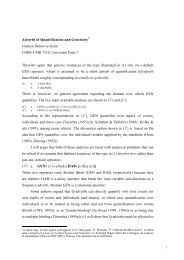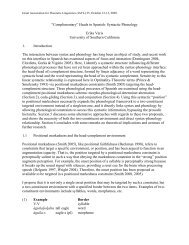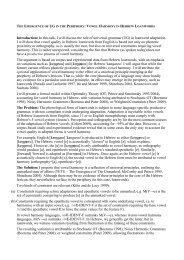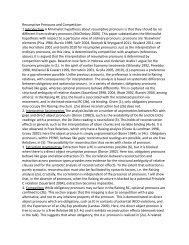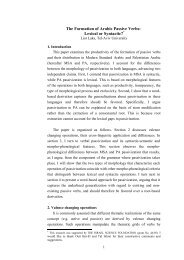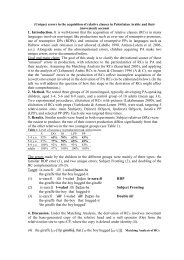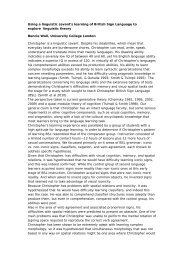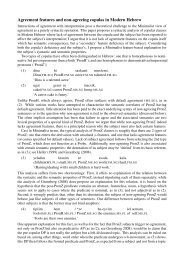paper
paper
paper
You also want an ePaper? Increase the reach of your titles
YUMPU automatically turns print PDFs into web optimized ePapers that Google loves.
In addition, there is another interesting construction in Russian, illustrated in (3) by the<br />
first reading. (The second reading is the instance of s-adjunction, as will be shown below).<br />
Some analyses assume that this construction (on the first reading) is also an instance<br />
of s-coordination (e.g. McNally (1993)), others ascribe the adjunction structure to it<br />
(e.g.Ladusaw (1989)).<br />
(3) My<br />
We.Nom<br />
s<br />
with<br />
Dašei<br />
Dasha.Instr<br />
xodim<br />
go.PL<br />
v<br />
to<br />
školu.<br />
school<br />
Dasha and I go to school./Dasha and we go to school.<br />
I will begin the discussion with the syntactic and semantic differences between with-conjuncts<br />
and with-adjuncts. In order to make my exposition simpler, I will examine data that involve<br />
the comitative construction with singular noun phrases; however, the same arguments are<br />
applicable to the comitative construction with plural noun phrases. Having established that<br />
there are two types of with-phrases, I will compare s(with)-coordination with i(ordinary)-<br />
coordination. I will show that the two types of coordination realize different syntactic<br />
structures. Then, I will argue that examples like the first reading of (3) are instances of the<br />
Inclusive Plural Pronoun Construction (IPPC). A formal account of the three comitative<br />
types within the framework of HPSG will be proposed.<br />
2 Comitative Adjuncts vs. Comitative Conjuncts<br />
Russian has comitative prepositional phrases which are VP-adjuncts consisting of the preposition<br />
s (with) and an instrumental case-marked NP. I will summarize the main arguments<br />
in favor of distinguishing adjunction from s-coordination. Some of these arguments<br />
have been mentioned in previous literature with regard to Polish, Latvian, Hungarian and<br />
other languages (see Schwartz (1988),Schwartz (1988),Ladusaw (1989),Dyła (1988),Aissen<br />
(1988),Aissen (1989),Urtz (1994),Vassilieva (2000) among others).<br />
2.1 Number Agreement<br />
In Russian, only nominative-marked NPs agree with the verb. If a sentence lacks a nominativemarked<br />
NP, then the verb is in its third person singular neuter form, as can be seen from<br />
the following examples:<br />
(4) (a) Oni<br />
They.Nom<br />
xotjat<br />
want.PL<br />
They want to drink.<br />
pit’.<br />
drink.Inf



